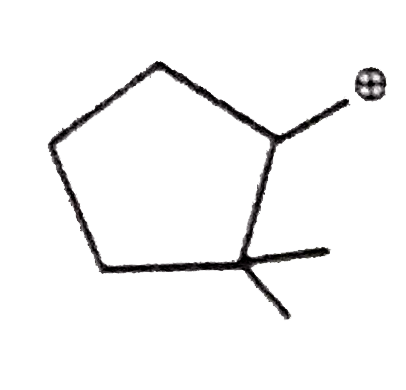
Write the number of intermediate which is involved in the given reaction is:
1. For Carbocation
2. For Free radical
3. For Carbanion
4. For Cyclicbrominium ion
Carbocation
Free radical
Carbanion
Cyclicbrominium ion
The correct Answer is:B
NA
Topper's Solved these Questions
- BOOK - RESONANCECHAPTER - TEST PAPERSEXERCISE - PART - III CHEMISTRY SEC - 112videos
TEST PAPERS
- BOOK - RESONANCECHAPTER - TEST PAPERSEXERCISE - PART - III CHEMISTRY SEC - 218videos
TEST PAPERS
- BOOK - RESONANCECHAPTER - SURFACE CHEMISTRYEXERCISE - Section - 51videos
SURFACE CHEMISTRY
- BOOK - RESONANCECHAPTER - TEST SERIESEXERCISE - CHEMISTRY50videos
TEST SERIES
Similar Questions
1.correlation OF lone pairs and formal charges, 2.reaction intermediates a) carbocation, b)carbanion,c) free radicals
View SolutionReaction intermdiates are short lived species and are highly reactive. They are formed by heterolytic and homolytic bond fission. There are various types of reaction intermediates in which the most important are carbocation , carbanion and free radical.
Carbocation is an organic species in which carbon have positive charge and six electrons in its outermost shell. The stability of carbocation can be increased by positive inductive effect, hyperconjugation and delocalisation. If α-atom with respect to carbocation has one or more lone pair of electron then lone pair of electron strongly stabilises the carbocation due to octet completion.
Species in which carbon have negative charge is called carbanion. Carbanion carries three bond pairs and one lone pair. The stability of carbanion can be increased by negative inductive effect, negative mesomeric effect and delocalisation.
Free radical is a species which have seven electrons in its outermost shell. The stability of free radical can be increased by hyperconjugation and delocalisation.
Which of the following is the most stable carbanion intermediate ?View Solution
Knowledge Check
- Question 1 - Select One
Reaction intermdiates are short lived species and are highly reactive. They are formed by heterolytic and homolytic bond fission. There are various types of reaction intermediates in which the most important are carbocation , carbanion and free radical.
Carbocation is an organic species in which carbon have positive charge and six electrons in its outermost shell. The stability of carbocation can be increased by positive inductive effect, hyperconjugation and delocalisation. If α-atom with respect to carbocation has one or more lone pair of electron then lone pair of electron strongly stabilises the carbocation due to octet completion.
Species in which carbon have negative charge is called carbanion. Carbanion carries three bond pairs and one lone pair. The stability of carbanion can be increased by negative inductive effect, negative mesomeric effect and delocalisation.
Free radical is a species which have seven electrons in its outermost shell. The stability of free radical can be increased by hyperconjugation and delocalisation.
The stability order of following carbocations is
 AI>II>IIIBII>I>IIICIII>I>IIDII>III>I
AI>II>IIIBII>I>IIICIII>I>IIDII>III>I - Question 2 - Select One
Which of the following reaction mechanism doe not involves carbocation as an intermediate ?
ABaeyer-Villiger oxidationBBeckman rearrangementCFries RearrangementsDDiels- Alder reaction - Question 3 - Select One
Reaction intermdiates are short lived species and are highly reactive. They are formed by heterolytic and homolytic bond fission. There are various types of reaction intermediates in which the most important are carbocation , carbanion and free radical.
Carbocation is an organic species in which carbon have positive charge and six electrons in its outermost shell. The stability of carbocation can be increased by positive inductive effect, hyperconjugation and delocalisation. If α-atom with respect to carbocation has one or more lone pair of electron then lone pair of electron strongly stabilises the carbocation due to octet completion.
Species in which carbon have negative charge is called carbanion. Carbanion carries three bond pairs and one lone pair. The stability of carbanion can be increased by negative inductive effect, negative mesomeric effect and delocalisation.
Free radical is a species which have seven electrons in its outermost shell. The stability of free radical can be increased by hyperconjugation and delocalisation.
The stability order of following free radicals is:
C6H5CIH2⋅CH2 CH3CIIH2⋅CH2 C6H5 III⋅CH2 CH⋅3IVAI>II>III>IVBII>III>I>IVCI>III>II>IVDIII>II>I>IV
Which of the following reactions involve carbanion enolalte as reactive intermediate?
View SolutionWhich of the following reactions are completed through free radical intermediate ?
View SolutionWhenever an intermediate carbocation is formed in reaction it may rearranges.
Only those carbocation will rearrange which can produce more stable species . It can be done either by :
(i) Shifting of H, alkyl , aryl, bond (1,2-shifting )
(ii) Ring expansion
(iii) Ring contraction
Most stable rearranged carbocation is is View Solution
is View SolutionOrganic reactions take place through the formations of reactive carbon intermediates formed by cleavage of covalent bonds. Formation of these intermediates depends upon the dissociation energies of covalent bonds.
In which cases, free radicals can be formed by homolytic fission ?View SolutionCH3−CH∣CH3−CH3∣C∣CH3−CH2BrNaOH−−−−−−→HOH
Consider the following statement for the given reaction
1. The reaction is SN1
2. The reaction intermediate is carbocation
3. The major product will be 2,3-dimethyl-3-pentanol
4. The major product has one stereogenic centreView Solution

